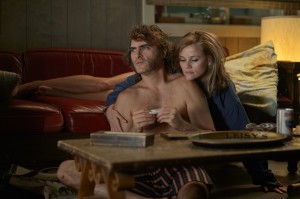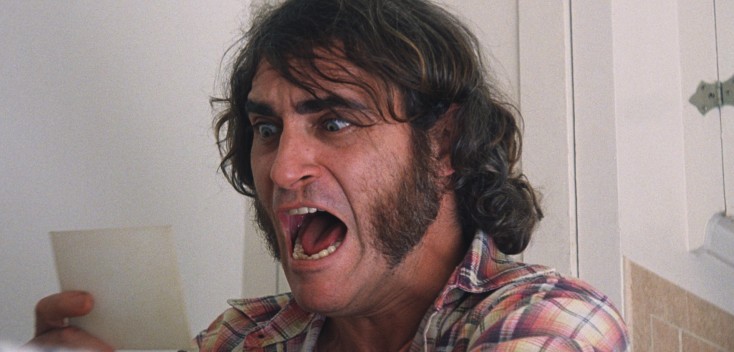
(l-r) Joaquin Phoenix as Doc Sportello and Reese Witherspoon as Hope Harlingen in INHERENT VICE. ©Warner Bros. Entertainment. CR: Wilson Webb.
By ANGELA DAWSON
Front Row Features
HOLLYWOOD—The big question this week in Hollywood was: Is he or isn’t he? The “he” in question is Joaquin Phoenix and the question was “Is he really engaged to his yoga instructor or not?”
On Monday’s “Late Night with David Letterman,” the three-time Oscar nominee told the talk show host he had popped the question to his yoga instructor, and “if everything works out” he would be getting married.
The very next day, the 40-year-old performer revealed to George Stephanopoulos on “Good Morning America” that he wasn’t engaged and, in fact, he made up the whole story on “Letterman” to make the audience happy.
“I think my life’s so boring, and it seemed like something exciting to talk about, and I wanted the audience to like me,” he said on the morning talk show. “They really like people getting married.”
Phoenix, who had pulled an odd stunt on Letterman five years ago, has been making the rounds on talk shows to promote his new movie, the early ‘70s set comedy “Inherent Vice.” In the Paul Thomas Anderson-directed film, the actor plays a private detective named Doc Sportello, who is asked by his former girlfriend to help foil a plot by her new boyfriend’s wife and her lover to institutionalize her real estate mogul husband.
As the pot-smoking private eye digs deeper into his investigation, he becomes part of a complicated web that involves a young runaway, a cop that has it in for him, an underground dentist ring and a mysterious schooner suspected of bringing illegal goods into the country.
Based on the Thomas Pynchon 2009 novel, the film’s star-laden cast includes Josh Brolin, Benicio Del Toro, Owen Wilson, Jena Malone and Reese Witherspoon, with whom he co-starred in the acclaimed Johnny Cash biopic. Witherspoon plays a lawyer in L.A.’s district attorney’s office who feeds him information.
Just a day before the whole “is he or isn’t he” brouhaha started, Phoenix spoke at a downtown hotel about his starring role, working with Anderson and reuniting onscreen with Witherspoon. He also hinted at his comparatively boring life outside of his work that may have led to his latest media misadventure.[private]
Q: You’re in nearly every scene of the movie.
Phoenix: (deadpan) I’m so sorry.
Q: It’s okay. Did you feel the weight of that on you or were you joyful to be that involved?
Phoenix: I like working all the time. I dread having days off. Weekends are the hardest thing to get through. Paul and I would always talk about how we wish we could keep shooting straight through. I’m not able to do that. I wish I could. I marvel how some of the actors who would work for a couple of days and then be off for a week. Katherine came in and worked for the first couple of weeks and then she was gone for about three weeks and then she came back to shoot some more. That is so difficult to get back in the groove. I need to be there every day and I find it difficult to have breaks.
Q: Did you always feel that way?
Phoenix: Sometimes I didn’t have a choice. There were some projects where I didn’t have the opportunity to work every day. You start out doing supporting roles. I remember doing “Gladiator.” I worked the first few weeks and then I was off for three weeks, and it was very difficult for me to get back into it.
Q: For the “Inherent Vice” role, did you read Thomas Pynchon’s book or did you strictly go by the script?
Phoenix: Paul gave me the book first. So I read the book and then I read the script, and then I then I started reading the book a second time, and about halfway through, I thought I don’t want to know this too well. I want to be confused by what’s going on, so then I would just pick up the book occasionally, like if there was a scene that we were working on and I was trying to find something new for that scene.
Paul had this way where he combined some characters because you can’t use all the characters from the book, so he would take dialogue from one character and apply it to another. I would remember the dialogue but I’d be confused why Jade was saying it because I didn’t remember her saying it (in the book). Paul would stir it up and make me feel really confused about it. I’d be doing a scene with Jade (Hong Chau), and he would walk around and just look at her, suspiciously. And I’d say to him, “Is she involved in the Golden Fang?” or “Does she know about Shasta?” He’d be like, “I don’t know, man. You’ll have to figure it out?” So he really just created this environment where I was confused and really never knew what was going to happen next and what role somebody was playing in the story.
Q: Did you ultimately figure it out?
Phoenix: No, I still haven’t figured it out.
Q: I heard that Pynchon snuck onto the set. Is that true?
Phoenix: I read that too. I never asked Paul, “Is Pynchon around?” I just figured (visiting the set) wasn’t his process and I respected that.
Q: How did you and Paul get along?
Phoenix: I like his demeanor and the way he sees the world. He’s always searching for something else. In a movie, because you have such a little amount of time and they are always so expensive, people are always trying to lock on a rigid way what the scene is about. Usually, you’re told, “This is a scene in which you have an argument with this girl and it’s a device that leads to this scene…” But Paul is really unique in that he thinks that, but then he wants to find out what else is going on. He says, “There’s something else we haven’t discovered yet,” and I like that way of working. It keeps everybody just searching and working really hard to find something unexpected.
Q: Does that mean you ad-libbed anything or did you stick to the script?
Phoenix: I wanted to stick to the script and the book. One of the things that is difficult when you adapt a book is there is dialogue that you just love. Pynchon’s words are just great. I remember trying to get this dialogue into the scene and it just wasn’t working. Sometimes it just doesn’t translate (to screen). That is very difficult. So there wasn’t much ad-libbing from me. Oftentimes, Paul will shoot multiple versions of a scene. Sometimes you’ll shoot five takes of a scene, and then he’ll say, “Maybe we should switch this dialogue around” or “Say what you want.” More than likely he won’t use that but the feeling that you’ve created while veering off the script is something that you then bring to the next scene.
Q: How was it working with Reese Witherspoon again?
Phoenix: I love working with Reese Witherspoon. It’s funny because it had been 10 years but it’s like nothing had changed. We did our first scene and she (joked), “Is that how you’re going to do it? Alright, then I’ll have to say this again.” I was like, “Here we go.” She made the movie last time and she’s great in this too.
Q: There seems to be a comfortableness between your two characters. What was it like being back on set together?
Phoenix: I didn’t think about “Walk the Line.” The first scene we did was really a big scene so I was just thinking about remembering my lines and listening to the other actor so I never really thought about it that way.
Q: Are you more comfortable in your skin now than you were after you made “Walk the Line?”
Phoenix: I don’t know. I feel uncomfortable right now with that question.
Q: What do you like to do when you’re not acting?
Phoenix: It always seems like (I’m) being evasive or trying to hide something but I think there is so much that gets talked about when you’re an actor that you have no control over so that those things that are yours that you do, you tend not to really want talk about them. Right? The exciting part of my life is when I’m working, and when I’m not working, I like a very simple, quiet existence. So, there’s nothing really exciting to report.
Q: Do you look at a project and say, “This is something I can wrap my head around it and the audience is going to be able to wrap their head around it?” Is there something else about a script that attracts you to it?
Phoenix: I’ve got to say I’m really selfish. I don’t think about the audience. I don’t really know why I make the decisions that I make. I wish I did so I could give you a solid answer. It’s usually just a feeling. It’s kind of like falling in love. You don’t really understand it. It’s just something you have to experience and nothing can keep you away from it. I try to come up with reasons but I don’t fully understand it.[/private]




